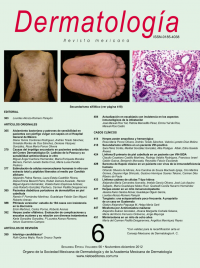RESUMEN
Antecedentes: la candidina es el extracto total obtenido de Candida albicans, y es la conjunción de proteínas de superficie e internas que se utiliza en la reacción intradérmica para el estudio de hipersensibilidad tardía. Se ha demostrado que C. albicans o sus diferentes antígenos estimulan la respuesta proliferativa de linfocitos in vitro. Se han realizado estudios de los principales componentes manoproteicos de C. albicans implicados en la inmunomodulación de las defensas del huésped. Entre las presentes en el extracto ácido se encuentra una proteína de 65 kDa (MP65), que es el principal blanco sobre el que se monta una respuesta por parte de las células T. Objetivo: estimular células mononucleares humanas in vitro con péptidos de extracto total y péptidos secretados al medio de cultivo por Candida albicans y la mezcla de ambos. Material y métodos: para obtener el extracto total (ET) de Candida albicans, se cultivó la cepa de referencia ATCC 10231 de este hongo en medio Sauton durante cinco días a 37ºC. La biomasa se separó por centrifugación y se solubilizó en solución salina isotónica; la rotura celular se hizo por sonicación y del sobrenadante obtenido se precipitaron las proteínas con solución saturada de sulfato de amonio, el cual fue removido posteriormente por diálisis. El extracto total se ajustó a una concentración de proteínas de 1 mg/mL. Para obtener proteínas liberadas al medio, a partir del medio de crecimiento de Candida albicans se procedió a precipitarlas y purificarlas con el mismo tratamiento descrito para el extracto total. Las células mononucleares humanas (CMH) se tomaron de sangre periférica y se purificaron con Lymphoprep; se lavaron con solución salina y se resuspendieron en medio de RPMI, ajustándose a 1×106 células/mL. Las citocinas se cuantificaron con la técnica de ELISA, utilizando los paquetes de R&D Systems Quantikine® Human IFN-g número de catálogo DIF50, y el paquete de R&D Systems Quantikine® Human IL-2 número de catálogo D2050, para cuantificar la IL-2. Resultados: el estudio electroforético del extracto total de Candida albicans mostró principalmente un péptido de 60 a 65 kDa, aproximadamente, al cual se le atribuye la estimulación de la respuesta inmunitaria tipo TH1. Es clara la observación de la alta producción de INF-g por las CMH activadas por los péptidos del extracto total de Candida albicans, que es mayor a la producción de INF-g proporcionada por la estimulación de CMH con PHA y con los péptidos purificados del medio de cultivo del mismo microorganismo. El péptido purificado de medio estimula la producción de IL-2 en concentraciones representativas, aunque no muy altas a las 24 horas de activación y a las 96 horas para el extracto total. Conclusión: los péptidos del extracto total de Candida albicans son muy eficientes en la activación de células mononucleares humanas in vitro para la producción de INF-g y también estimula la producción de IL-2. Los péptidos del extracto total de Candida albicans son capaces de estimular la formación y activación de células T CD4 H1. Palabras clave: candidina, Candida albicans.
Palabras clave: Candida albicans, candidina
ABSTRACT
Background: Candidin is a total extract obtained from Candida albicans, and a combination of both surface and internal protein, for the study of intradermal reaction of late hypersensitivity. It has been shown that C. albicans or its different antigens stimulate lymphocyte proliferative response in vitro. Several studies about the major mannoproteins components of C. albicans implicated in immunomodulation of host defenses were carried out. A protein of 65 kDa (MP65) is present in acid extract which is the primary target on which is mounted a response by T cells. Objective: To stimulate human mononuclear cells in vitro with peptides of total extract, and peptides secreted into the culture medium by Candida albicans and the mixture of both. Material and methods: To obtain the total extract (TE) of Candida albicans, strain ATCC 10231 was grown in Sauton media at 37ºC for five days. Biomass was separated by centrifugation and solubilized in isotonic saline. The cell disruption was made by sonication and the supernatant obtained by centrifugation proteins were precipitated using saturated ammonium sulfate which was subsequently removed by dialysis. ET was adjusted to a concentration of 1 mg/mL of protein. To obtain proteins released to the medium, directly from the growth medium of Candida albicans the precipitation and purification of proteins proceeded by the same treatment described for ET. Human mononuclear cells (MHC) were taken from peripheral blood and were purificated with Lymphoprep, washed with saline solution and mixed in the middle of RPMI, adjusting to 1×106 cells/mL. Cytokines quantification was carried out by the ELISA technique using the kit of R&D Systems Quantikine® Human IFNg number of catalogue DIF50, and the kit de R&D Systems Quantikine® Human IL-2 number of catalogue D2050. Results: Electrophoretic study of total extract of Candida albicans showed mainly one peptide of 60 to 65 kDa approximately, which is attributed to the stimulation of the TH1 type immune response. It is a clear observation of the high production of INF-g by MHC activated by peptides of the total extract of Candida albicans, which is greater than the production of INF-g provided by the stimulation with PHA and peptides purified from the culture medium of the same microorganism. Medium purified peptide stimulates the production of IL-2 at representative concentrations, but not very high at 24 hours of activation, and 96 hours for the total extract. Conclusion: Peptides of the total extract of Candida albicans are very good in the activation of human mononuclear cells in vitro for the production of INF-g. They stimulate production of IL-2, too. The peptides obtained from the total extract of Candida albicans can stimulate the formation and activation of cells T CD4 TH1. Key words: candidin, Candida albicans.
Keywords: Candida albicans, candidin

